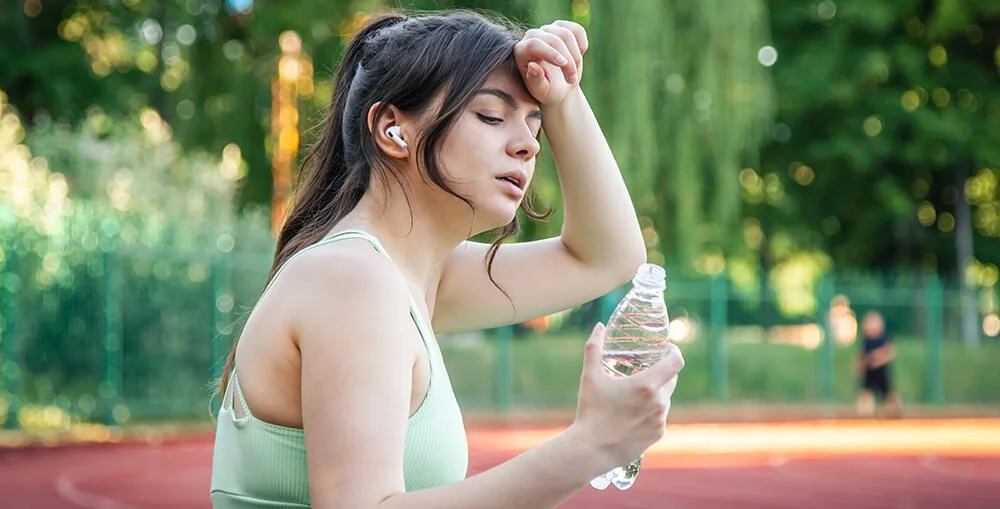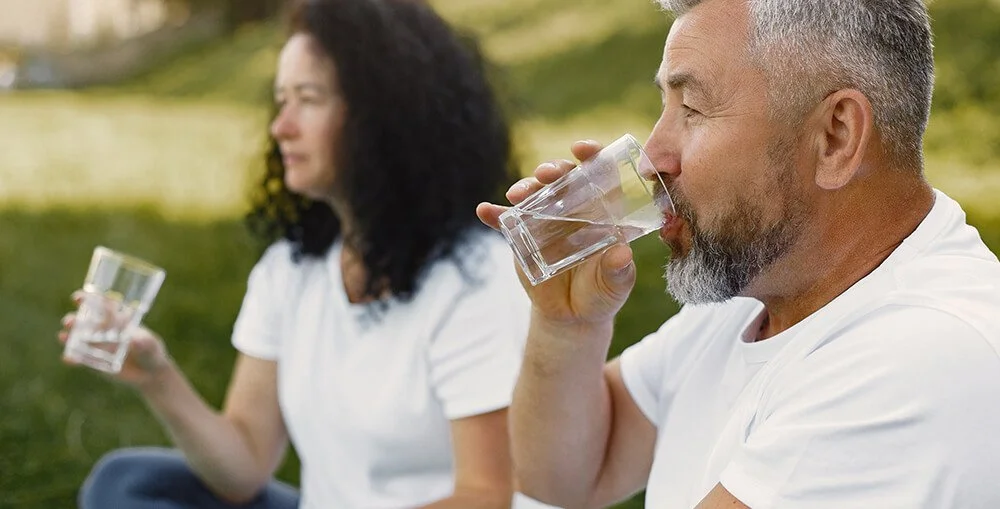Staying Refreshed on Hot Summer Days
Table of Contents Show
While the sun has not come out fully yet! We are approaching the good weather, and if it is anything like previous summers, we are looking for another hot summer!
When the sun is shining, the birds are singing, it's a perfect day for a walk!
But at times, the heat can be stifling.
This is never fun, but while it should not stop you from enjoying your daily exercise or running around Stanley Park, it presents certain risks that we sometimes do not consider. High temperatures can increase dehydration, heat exhaustion, and heatstroke risks.
Staying properly hydrated and taking measures to keep your body cool is essential for safe summer walks. This is why we have put together this article, hoping to provide a reminder or share new tips to help you stay refreshed and enjoy your hot weather outings safely.
The Importance of Staying Hydrated
We all know it to be true, but how often do we head out the door bringing a bottle of water or believe everything will be fun until we get home or find a local shop?
Proper hydration is absolutely vital when exercising in hot weather. As your body temperature rises during physical activity, you lose fluids through increased sweating. If those fluids aren't replaced, dehydration can set in. Even mild dehydration of just 1-2% of body weight can drain your energy levels and impair exercise performance.
Dehydration causes a reduction in blood volume, making the heart work harder to circulate blood and deliver oxygen to working muscles. This can lead to muscle fatigue, increased body temperature, and higher perceived exertion during exercise. Severe dehydration increases the risk of dangerous heat illnesses like heat exhaustion and heatstroke.
To prevent dehydration, it is recommended that people drink 4 to 8 ounces of fluid every 15 to 20 minutes during exercise,” Dr. Eby says from Mass General Brigham. “If you are participating in moderate activity in a climate that isn’t very warm, you may be able to consume the lower end of that spectrum — 4 ounces every 20 minutes. High-intensity exercise in the heat might require the higher end of that spectrum — 8 ounces every 15 minutes.”
In addition to replacing fluids, it's also important to replenish electrolytes like sodium and potassium that are lost through excessive sweating.
Sports drinks containing electrolytes can be helpful for intense outdoor exercise, but watch out for their high sugar content. Foods like bananas, yogurt, and electrolyte tabs or powders are healthier options to maintain proper electrolyte balance.
Hydration Strategies for Summer Walks & Exercise
Now that we've covered why proper hydration is so crucial for hot weather walks let's dive into specific strategies to help you stay refreshed mile after mile.
Applying these hydration tips before, during, and after your summer outings will keep you feeling energized and prevent dehydration from dampening your exercise. To ensure you remain refreshed and hydrated, follow these essential tips:
Pre-walk hydration:
Begin your hydration journey even before you step foot outside. Drink a glass of water or a hydrating beverage about 30 minutes before your walk.
This pre-walk hydration primes your body by replenishing fluids and preparing you for the upcoming exertion. To kickstart your hydration routine, opt for cool water, herbal infusions, or electrolyte-rich drinks.
Drinking water during the walk
Remember to carry a water bottle and take regular sips along the way. Aim to drink small amounts of water every 15-20 minutes to maintain hydration levels. Investing in a reusable water bottle with a built-in straw or sipper makes staying hydrated on the go easier.
Additionally, if you're planning a longer walk or engaging in more intense physical activity, consider bringing a hydration backpack or waist belt with a water reservoir for convenient access.
Using sports drinks for longer walks
Sports drinks can provide an extra boost of hydration for extended walks or intense physical activity.
These beverages contain electrolytes like sodium, potassium, and magnesium, which help replenish the minerals lost through sweating. Sports drinks also provide carbohydrates, contributing to maintaining energy levels during prolonged exercise.
However, sports drinks are unnecessary for shorter walks or moderate activity. Reserve them for more demanding outings where you anticipate increased fluid and electrolyte losses.
Don't wait until you're thirsty: Thirst is a sign your body is already dehydrated.
Dressing appropriately
Your choice of clothing can significantly impact your body's ability to stay cool and comfortable. Opt for light-coloured, loose-fitting garments made from breathable fabrics like cotton or moisture-wicking materials.
These fabrics allow air circulation, facilitate sweat evaporation, and prevent excessive heat buildup. Remember to wear a wide-brimmed hat to shield your face and scalp from direct sunlight.
Apply sunscreen generously to exposed skin and wear sunglasses to protect your eyes from harmful UV rays.
Signs of Heat Sickness and Dehydration
Even with proper hydration strategies, it's important to recognize the warning signs that your body is overheating or dehydrating during hot weather exercises.
Catching these early symptoms can prevent progression to more severe heat illness. Be mindful of signs indicating heat sickness or dehydration. Take a look at the list of symptoms that can indicate heat-related issues:
| Signs of Dehydration | |
|---|---|
| Excessive thirst | Dry mouth |
| Headache | Dizziness or lightheadedness |
| Dark yellow urine | Muscle cramps |
| Signs of Heat Exhaustion | |
|---|---|
| Heavy sweating or rapid heartbeat | Cold, clammy skin |
| Fatigue or weakness | Nausea or vomiting |
| Muscle cramps | Headache |
If you experience any of these symptoms, immediately stop your walk and move to a shaded or air-conditioned area. Rehydrate with water or an electrolyte drink.
Cool your body by applying wet towels or taking a cool shower. Seek medical attention if symptoms persist for more than an hour. The most serious form of heat illness is heatstroke, which requires emergency treatment. Signs include:
Body temperature above 103°F
Skin that is hot, red, and dry
Rapid, strong pulse
Possible unconsciousness
If heatstroke is suspected, call 911 immediately and try to lower the person's body temperature with whatever cooling methods are available until help arrives.
Sip all day, every day: Make a habit of taking small, frequent sips of water!
Conclusion
Don't let the summer heat deter you from your walking routine. With some preparation and preventative measures, you can walk safely even on the hottest days.
Be sure to hydrate properly before, during, and after your walks. Wear sun protection and light, breathable clothing. Take steps to keep your body cool, like misting with water or seeking shady routes. And most importantly, listen to your body's signals and don't push through heat exhaustion.
You can also beat the heat and make the most of your walking routine by choosing the right time and route and dressing appropriately.
Remember to adjust the intensity of your walks to accommodate the hot weather and listen to your body's needs. Prioritize safety and monitor your health closely, aware of the signs of heat sickness and dehydration. Here are the essentials to consider when going out.
| Hydrating Summer Exercises & Walks Essentials | |
|---|---|
| ✓ Reusable water bottle | ✓ Sun hat and sunglasses |
| ✓ Sunscreen SPF 30+ | ✓ Handheld misting fan or spray bottle |
| ✓ Cooling towel | ✓ Light, breathable clothing |
Now that you have a toolkit of strategies for staying refreshed during summer walks and exercises, it's time to lace up your shoes, embrace the sun's warmth, and embark on a rejuvenating journey.
Enjoy the beauty of nature, boost your fitness, and revel in the countless benefits of walking.
If you have any concerns about exercising in the heat, our wellness professionals at West End Wellness would gladly provide guidance. Safe and happy walking!
If you have any further doubts or questions regarding this subject or another treatment, contact one of our experienced Acupuncturists or Registered Massage Therapists here at West End Wellness Clinic. You can either give us a call or make an appointment.
Disclaimer: Please remember this article is for informational purposes only and should not replace professional medical advice. Please consult a healthcare provider or someone with the correct qualifications before starting any new exercise or treatment program.



